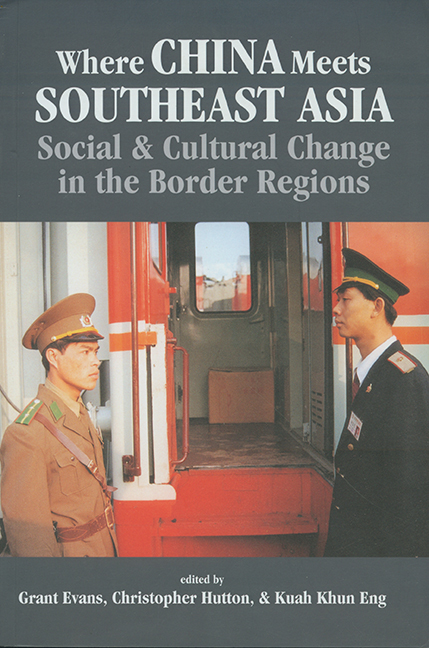Book contents
- Frontmatter
- Contents
- Contributors
- Map
- Introduction: The Disappearing Frontier?
- 1 Where Nothing Is as It Seems: Between Southeast China and Mainland Southeast Asia in the “Post-Socialist” Era
- 2 The Southern Chinese Borders in History
- 3 Ecology Without Borders
- 4 Negotiating Central, Provincial, and County Policies: Border Trading in South China
- 5 The Hmong of the Southeast Asia Massif: Their Recent History of Migration
- 6 Regional Trade in Northwestern Laos: An Initial Assessment of the Economic Quadrangle
- 7 Lue across Borders: Pilgrimage and the Muang Sing Reliquary in Northern Laos
- 8 Transformation of Jinghong, Xishuangbanna, PRC
- 9 The Hell of Good Intentions: Some Preliminary Thoughts on Opium in the Political Ecology of the Trade in Girls and Women
- 10 Cross-Border Mobility and Social Networks: Akha Caravan Traders
- 11 Cross-Border Links between Muslims in Yunnan and Northern Thailand: Identity and Economic Networks
- 12 Trade Activities of the Hoa along the Sino-Vietnamese Border
- 13 Cross-Border Categories: Ethnic Chinese and the Sino-Vietnamese Border at Mong Cai
- 14 Regional Development and Cross-Border Cultural Linkage: The Case of a Vietnamese Community in Guangxi, China
- 15 Women and Social Change along the Vietnam-Guangxi Border
- Index
11 - Cross-Border Links between Muslims in Yunnan and Northern Thailand: Identity and Economic Networks
Published online by Cambridge University Press: 21 October 2015
- Frontmatter
- Contents
- Contributors
- Map
- Introduction: The Disappearing Frontier?
- 1 Where Nothing Is as It Seems: Between Southeast China and Mainland Southeast Asia in the “Post-Socialist” Era
- 2 The Southern Chinese Borders in History
- 3 Ecology Without Borders
- 4 Negotiating Central, Provincial, and County Policies: Border Trading in South China
- 5 The Hmong of the Southeast Asia Massif: Their Recent History of Migration
- 6 Regional Trade in Northwestern Laos: An Initial Assessment of the Economic Quadrangle
- 7 Lue across Borders: Pilgrimage and the Muang Sing Reliquary in Northern Laos
- 8 Transformation of Jinghong, Xishuangbanna, PRC
- 9 The Hell of Good Intentions: Some Preliminary Thoughts on Opium in the Political Ecology of the Trade in Girls and Women
- 10 Cross-Border Mobility and Social Networks: Akha Caravan Traders
- 11 Cross-Border Links between Muslims in Yunnan and Northern Thailand: Identity and Economic Networks
- 12 Trade Activities of the Hoa along the Sino-Vietnamese Border
- 13 Cross-Border Categories: Ethnic Chinese and the Sino-Vietnamese Border at Mong Cai
- 14 Regional Development and Cross-Border Cultural Linkage: The Case of a Vietnamese Community in Guangxi, China
- 15 Women and Social Change along the Vietnam-Guangxi Border
- Index
Summary
Islam is the second largest religion in the People's Republic of China (PRC), including about 20 per cent of all religious worshippers. Thailand, which nearly borders China's Yunnan province, is a Buddhist kingdom where Islam is accepted.
Administratively, China's near-twenty million Muslim population, 600,000 of which is Yunnanese, is divided into ten minorities. Islam in China is an irregular mosaic of nationalities and cultures. Since the Tang dynasty, the dominant Han have tried to sinicize Islam and integrate the Muslims; present Muslim identity reflects this historical fact (Berlie 1996, p. 213).
According to Joseph Fletcher (1934–84), three Islamic waves flowed into China (Gladney 1996, pp. 36–62). These three tides can be termed those of the “Old Religion” (laojiao, gedimu), mystic Sufism, and “New Religion”. The present complexity is a result of these three tides. The orthodox Sunni “Old Religion” is the main pillar of the state Chinese Islamic Association and dominates also in northern Thailand (although there is also a Pakistani influence). In dialectical Yunnanese, laotou (“Old Head”) is still a common self-designation of the Muslims, showing clearly that “Old Religion”, orthodox Islam, is predominant.
Most of the “New Religion” (xinjiao) reformers are also Sunnites and members of the Islamic Association through the network of mosques and other structural institutions.
Formerly involved in the trade with Thailand and Laos, the Sufi group (also Sunni) is divided into Naqshabandi tarîqa or pai (“schools” or “sects” in Chinese). Some follow the Islamic Association and the Party, while others are by tradition against the concept of non-Islamic governments.
Yunnanese Muslims are present in Keng Tung and Mae Sai in Myanmar, and in Chiang Rai and Chiang Mai in Thailand, where they are known as khon Islam or simply “Ho” (a Dai Lüe name for “Chinese” which has no religious connotation). In China, their common and official designation “Hui” (minzu or huizu) is a puzzling name; the character also means “return”.
- Type
- Chapter
- Information
- Where China Meets Southeast AsiaSocial and Cultural Change in the Border Regions, pp. 222 - 235Publisher: ISEAS–Yusof Ishak InstitutePrint publication year: 2000



